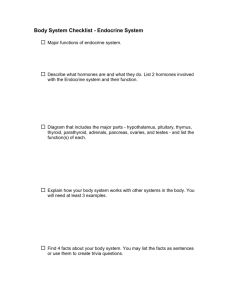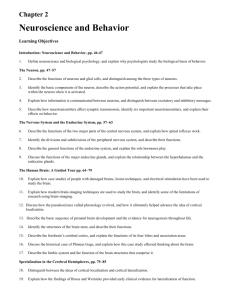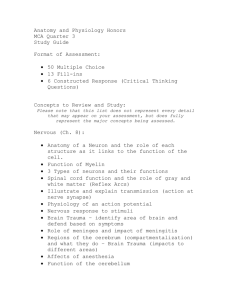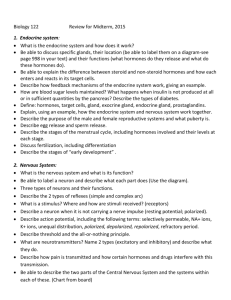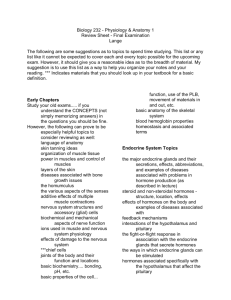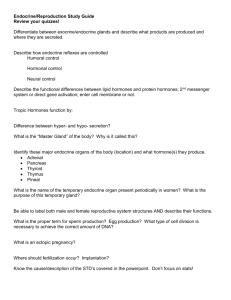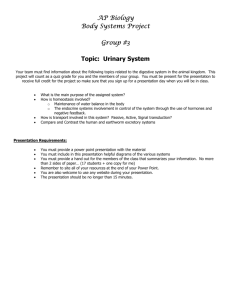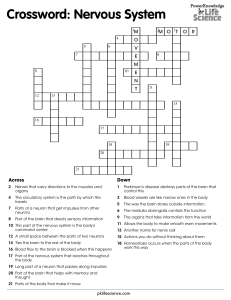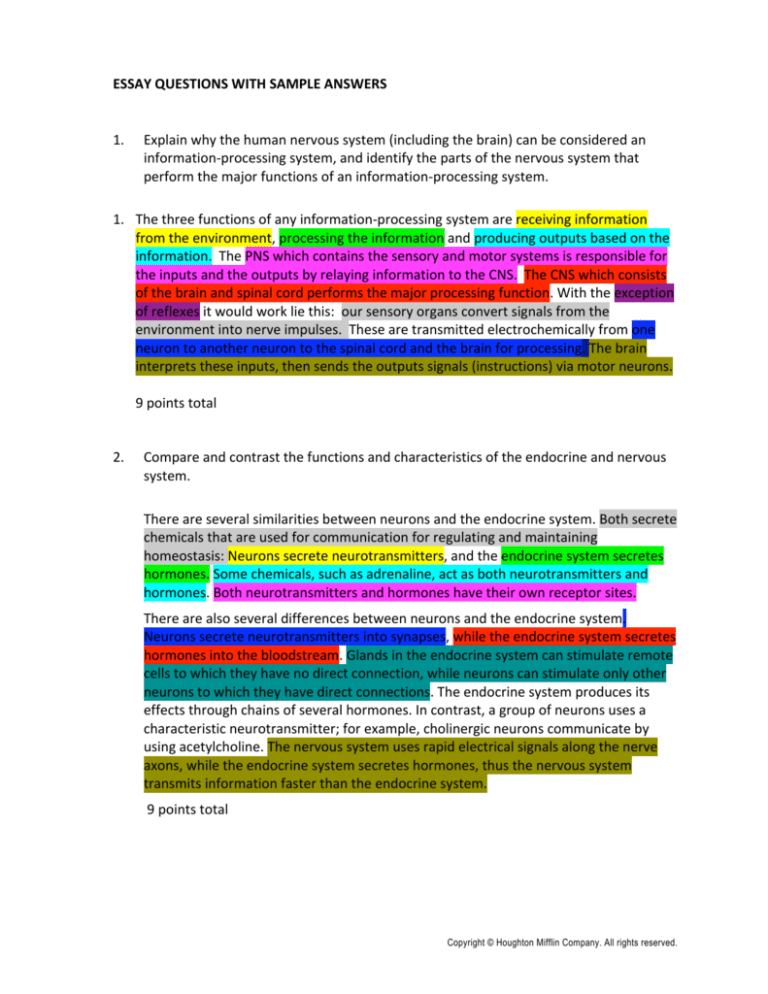
ESSAY QUESTIONS WITH SAMPLE ANSWERS 1. Explain why the human nervous system (including the brain) can be considered an information‐processing system, and identify the parts of the nervous system that perform the major functions of an information‐processing system. 1. The three functions of any information‐processing system are receiving information from the environment, processing the information and producing outputs based on the information. The PNS which contains the sensory and motor systems is responsible for the inputs and the outputs by relaying information to the CNS. The CNS which consists of the brain and spinal cord performs the major processing function. With the exception of reflexes it would work lie this: our sensory organs convert signals from the environment into nerve impulses. These are transmitted electrochemically from one neuron to another neuron to the spinal cord and the brain for processing. The brain interprets these inputs, then sends the outputs signals (instructions) via motor neurons. 9 points total 2. Compare and contrast the functions and characteristics of the endocrine and nervous system. There are several similarities between neurons and the endocrine system. Both secrete chemicals that are used for communication for regulating and maintaining homeostasis: Neurons secrete neurotransmitters, and the endocrine system secretes hormones. Some chemicals, such as adrenaline, act as both neurotransmitters and hormones. Both neurotransmitters and hormones have their own receptor sites. There are also several differences between neurons and the endocrine system. Neurons secrete neurotransmitters into synapses, while the endocrine system secretes hormones into the bloodstream. Glands in the endocrine system can stimulate remote cells to which they have no direct connection, while neurons can stimulate only other neurons to which they have direct connections. The endocrine system produces its effects through chains of several hormones. In contrast, a group of neurons uses a characteristic neurotransmitter; for example, cholinergic neurons communicate by using acetylcholine. The nervous system uses rapid electrical signals along the nerve axons, while the endocrine system secretes hormones, thus the nervous system transmits information faster than the endocrine system. 9 points total Copyright © Houghton Mifflin Company. All rights reserved.
85
Dr. S. White is currently working with seven patients. Each patient has abnormally high production of a neurotransmitter, and for each patient it is a different neurotransmitter that is affected. Dr. White wants to write up her research using nicknames to hide the true identities of her patients. Choose an appropriate nickname for each patient. Be sure to explain why the nickname is appropriate, as well as the symptoms one would expect to see in that patient. Chapter Error! Unknown document property name.: Error! Unknown document property name.
3. The nicknames for Dr. S. White’s patients could be as follows. Happy has high dopamine production. Dopamine is related to pleasure. It is also related to hallucinations and delusions. Happy may very well suffer from schizophrenia. Zippy has high norepinephrine production. Norepinephrine is related to energy. It is also related to anxiety and panic attacks. Zippy is probably getting treatment for stress and anxiety. Boozer looks like he’s drunk because he has high amounts of GABA. GABA is the major inhibitory neurotransmitter. Boozer needs to be watched carefully because he may pass out. Coolie has high levels of serotonin. High serotonin is related to relaxation and emotional wellness. Coolie is probably in Dr. White’s care because he feels so little anxiety he may take great risks or be involved in illegal activity that would make most people very nervous. Mania has high levels of glutamate. Glutamate is the major excitatory neurotransmitter and is related to learning and memory. Mania is probably being watched carefully by Dr. White because too much glutamate can over‐excite neurons to the points where they are destroyed. Poppy has high amounts of endorphins. Endorphins act like opiates, which come from opium (poppy seeds!). Poppy is probably numb to pain and feels pretty good. He needs to be watched carefully because he could lose consciousness and possibly die if levels get too high. Dopey has high acetylcholine, which is related to the parasympathetic nervous system. Dopey would just hang out, rest, and digest his food. His lack of energy and inability to properly react to stressful situations would explain why he is being seen by Dr. White. 7 points
4. Discuss how the endocrine and nervous systems become involved when a student feels stress – such as that associated with an upcoming final exam. The body’s response to stress is triggered by the nervous system. As the exam approaches the hypothalamus is activated. The pituitary gland, which is controlled by the hypothalamus, secretes a hormone which triggers the release of epinephrine, norepinephrine from the adrenal glands, which are part of the endocrine system. These hormones are secreted into the bloodstream. As these hormones activate, the body’s fight or flight response occurs (increased heart‐rate, breathing, blood pressure, sweaty palms, suppression of digestion). This occurs in the sympathetic division of the autonomic system. After the exam has passed, the parasympathetic part of the autonomic system would slow breathing, heartbeat, and cause hunger. 6 points total (maybe 7 if they score the red part) Copyright © Houghton Mifflin Company. All rights reserved.

